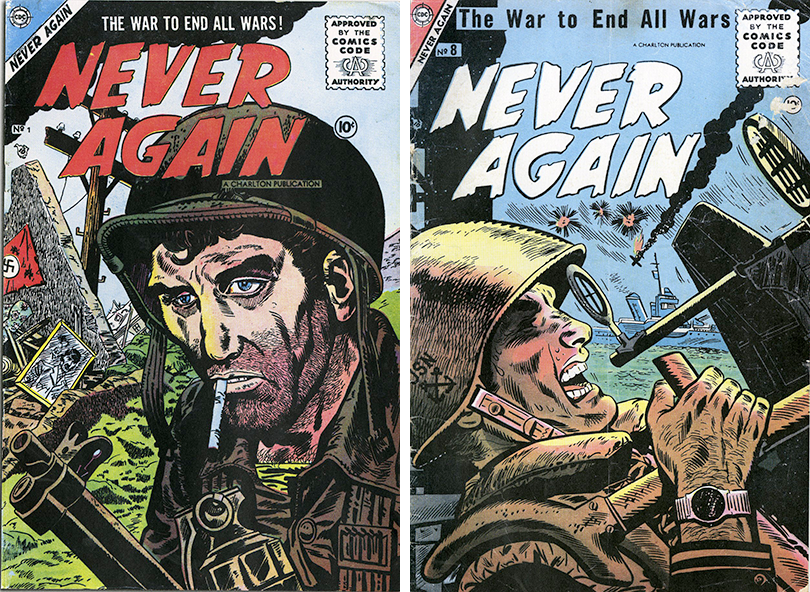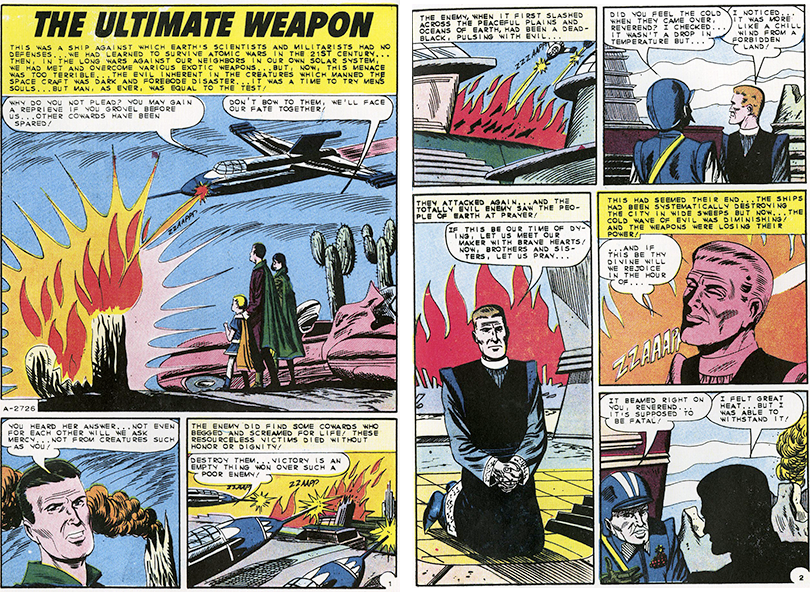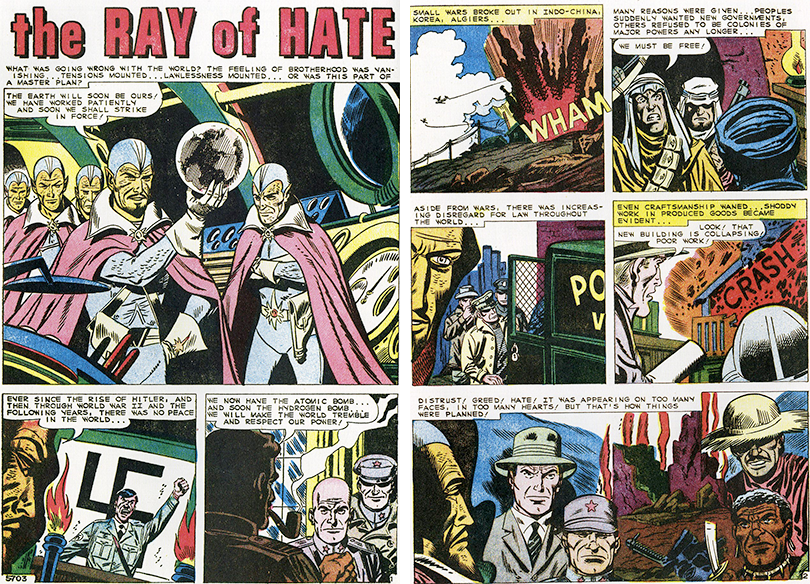The genre of “pro-war” or at least war-themed comics has long dominated the comic book field, especially during times of war. This is at once a form of propaganda and entertainment. It was certainly effective inspiration for many young boys. The Unknown Anti-War Comics: Featuring the Art of Steve Ditko of Spider-Man (IDW Publishing) edited by Craig Yoe, reveals that there was an element of dissent in the comics world. I queried Yoe about when and why anti-war comics began and the semi-secret legacy that he has uncovered.
The unique comics in The Unknown Anti-War Comics began during the 1950s Cold War. “People had witnessed during WWII the loss of lives and devastation that atomic bombs could ravage,” he explains. “As tension heated up between the United States and Russia, they were gripped by fear of humanity being wiped out. These comics were a creative and hard-hitting response to that and also a bit of the spin, at times, that ‘atomic power’ could somehow be harnessed for good not evil.”

Yoe cites “Never Again” as the first anti-war comic. It’s origins are a bit murky. He suspects that “Never Again” was packaged for a publisher that maybe sat on it for a while, but then went out of business and the material was bought by another publisher. Charlton Comics eventually printed it. “The Derby, Connecticut-based outfit, was dedicated to keeping their self-owned presses running around the clock not always caring a whit what the content was.” So “Never Again,” with its post WWI slogan-inspired title, kind of slipped in. This mid 1950s comic book only ran two issues, they were haphazardly, quizzically (Charlton’s oft M.O.) numbered #1 and #8, and the title was immediately canceled. Possibly the comic went defunct due to low sales, but more likely because that was all the material they had on hand and the powers-that-be at Charlton simply moved on to something else!
But what incredible stories there were in “Never Again” and totally singular in their point of view! Here are decidedly anti-war, pro-peace, gripping yarns in a field that churned out jingoistic propaganda war comics by the many thousands. I feel the “Two Men in the Sky” from “Never Again” is one of the most powerful, profound, and innovatively told stories in the comics medium.
During World War II, when war demonization and propaganda was in full gear, the U.S. government had a comics committee and authors and artists have to comply to certain official stereotypes. The government made it clear that, during World War II, they wanted the cooperation of the publishers who, in turn, had their writers and artists create propaganda in the guise of funny books, i.e. comics. “Kids and soldiers and folks in general were devouring the insanely popular comics of the time,” Yoe says. “Comics were an ubiquitous medium found in every newsstand on every big city corner, in candy, stationery, and drug stores, and in every G.I. PX. The comics community cooperated with flag-waving and grotesque, racist depictions of the enemy.”

The majority of the comics creators were happy to comply with the little known government program. Comics publishers had produced star-spangled, anti-Nazi comics even before Pearl Harbor, and then stepped up the activity when the U.S. officially entered the conflict. “I have evidence of one artist who was stressed by the pressures of drawing war-time propaganda, Charles Quinlan” relates Yoe about Quinlan’s daughter’s admission that her dad was “deeply troubled by the incessant requirement to draw racial stereotypes. This along with the pounding deadlines of comics fostered poor health and led to his early demise.”
World War II was a righteous war. Including such violently patriotic comics as “Sgt. Rock.” “I understand WWII was seen as righteous by most people,” Yoe admits, “however [in the book] I do my best to adhere to my pacifist convictions and resist all war even though that isn't always a clear or easy path for me. You may say I'm a dreamer!”
In fact, there was virtually no dissent against the Korean War in comics. “The war comics of that time had some of the most distorted caricaturing and demonizing of Asians to be found in the history of the pulp propaganda. A low of the lows,” he says.

This, of course, led to how the cold war was depicted. Yoe asserts, “This is where it got interesting. Publishers continued the business of comics war as usual, Hot or Cold. There were plenty of anti-commie comics about spies, from our side (good) and theirs (bad), and the threat of the atomic bomb (very bad). When kids ducked and covered during air raid drills, they probably grabbed from their brown paper lunch sack a comic book laden with better-dead-than-red-type stories to ravenously read under their desks until the all-clear bell rang!”
It makes sense that comics would play a propagandistic role. Yet at the same time, comics are not usually a polemic medium, and with the restrictive Comics Code in place, it was hard to create (and sell) anti-war comics. There are traditional “battle” comics in The Unknown Anti-War Comics, some of them quite movingly waging peace, but some of the most powerful stories in the collection are the science fiction ones drawn by Steve Ditko, the artist-creator of Spider-Man. “They are brilliant parables, beautifully drawn by the master at the height of his powers,” Yoe states, “that speak to the dangers of armed conflict and atomic war, and poetically trumpet peace and love as a hopeful and vital response.” A science-fiction story in the book by the artists Bill Molno and Rocco Mastroserio is eerily prescient. It involves endangered immigrants from another planet who come to earth to seek refuge. The earth leader proclaims, “I must warn you, any antagonistic move on your part will bring our armed forces into play...we will build a wall around you!” Yoe adds, “This three-page parable has a startling ending accompanied by a quote from one of the strongest peace passages from the Judeo-Christian bible. The circumstances are ripped out of today’s headlines. This story is one of the reasons Nobel Peace Prize-winner Jody Williams calls the book ‘powerful and timely!’”
“War is good for nothing,” Yoe states in his introduction, “but providing fodder for entertaining, sometimes compelling, often piognant, anti-war comic book stories.” The Unknown Anti-War Comics contributes to exposing one of the field’s “best kept secrets.”
